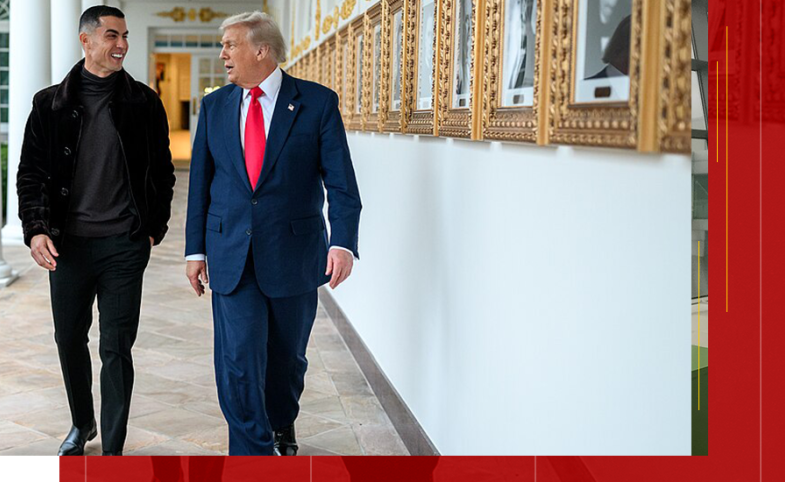The CPD Blog is intended to stimulate dialog among scholars and practitioners from around the world in the public diplomacy sphere. The opinions represented here are the authors' own and do not necessarily reflect CPD's views. For blogger guidelines, click here.

Public Diplomacy in the News: Venezuela's Messaging, China's Gaming Surge, & Ronaldo at the White House
“Public Diplomacy in the News” is a CPD Blog series by Andrew Dubbins that spotlights noteworthy stories on public diplomacy topics such as cultural diplomacy, nation branding, exchange programs, international events and conferences, digital diplomacy, and strategic global communications.
Venezuela deploys cartoons and humor. Venezuela’s government is deploying a mix of humor, spectacle, and selective outrage to manage escalating tensions with the United States, using everything from Nicolás Maduro’s “Super Mustache” cartoon persona to Diosdado Cabello’s combative talk-show theatrics to shape public perception. As U.S. warships gather offshore and President Trump threatens military action, Maduro casts himself as a peacemaker—singing “Imagine,” urging dialogue, and avoiding open attacks on Trump—while Cabello delivers blistering rants against U.S. officials, especially Secretary of State Marco Rubio, whom he frames as the true aggressor. Despite war preparations circulating on social media, the regime walks a careful line: rallying its base against an external threat without triggering public panic, even as its propaganda oscillates between sarcasm, denial, and calls for vigilance.
Max Saltman and Isa Cardona / CNN
China’s gaming surge goes global. China’s fast-expanding video-game industry is accelerating its global influence, propelled by blockbuster titles, massive esports events, and rising foreign investment interest. NetEase’s new martial-arts game Where Winds Meet drew over two million players within a day of its global launch, joining Tencent-backed Black Myth: Wukong in showcasing China’s ability to produce top-tier, internationally competitive games. Venture investors and Saudi Arabia’s Savvy Games are increasingly drawn to China’s booming esports scene, highlighted by a record-setting 62,000-person Honor of Kings final in Beijing’s Bird’s Nest stadium and strong overseas growth. With major firms investing heavily in storytelling, global distribution, and new technologies, Chinese companies are steadily gaining share in the global PC, console, and mobile gaming markets, positioning gaming as a rising pillar of China’s cultural soft power.
Cristiano Ronaldo’s White House dinner. A black-tie White House gala featuring Donald Trump, Cristiano Ronaldo, and Saudi Crown Prince Mohammed bin Salman captured how deeply sports, business, and geopolitics now intersect in 2025. Ronaldo’s presence—positioned beside the Crown Prince and circulating among tech titans, billionaires, and FIFA president Gianni Infantino—highlighted his transformation from global football icon to soft-power asset for Saudi Arabia, whose sovereign wealth fund employs him through Al Nassr. Experts suggest he was showcased as part of a broader Saudi effort to cement influence while Trump and the Crown Prince publicly reinforced their closeness despite ongoing human-rights scrutiny. With the 2026 World Cup looming, the event symbolized an era in which political leverage, personal alliances, and sports diplomacy blur together, raising questions about how decisions, from disciplinary rulings to visa policy, may be shaped by these elite networks.
Gold-Bar diplomacy pays off. Months of stalled negotiations shifted after Swiss corporate titans personally courted President Trump—with gifts, promises of U.S. investment, and high-profile hospitality—ultimately prompting him to slash punishing tariffs on Switzerland. In a coordinated campaign alongside official diplomatic outreach, executives from firms like Richemont, Mercuria, and Rolex appealed directly to Trump, pledging billions in U.S. manufacturing and presenting symbolic tokens such as an engraved gold bar and a Rolex desk clock. Their intervention revived talks that had collapsed after a tense summer call between Trump and Swiss President Karin Keller-Sutter, leading to a rapid deal reducing tariffs from 39% to 15%, easing economic pressure on Switzerland’s export-reliant industries, and setting a path to eliminate the trade imbalance by 2028.
Georgi Kantchev and Gavin Bade / The Wall Street Journal
AI slop floods the information space. Researchers warn that major state-linked propaganda networks are now churning out vast amounts of low-quality AI-generated content, accelerating their operations but failing to meaningfully influence audiences. An analysis by Graphika found that campaigns tied to China and Russia increasingly rely on generative AI to produce fake personas, synthetic news videos, manipulated audio, and clumsily translated text, yet most posts attract little engagement and often contain obvious errors such as visible prompts or unconvincing deepfakes. Despite its poor quality, the surge of automated content enables propagandists to scale cheaply and inundate the Internet, creating risks that AI models scraping online data may inadvertently amplify state-sponsored misinformation.
Visit CPD's Online Library
Explore CPD's vast online database featuring the latest books, articles, speeches and information on international organizations dedicated to public diplomacy.
POPULAR ARTICLES
-
January 29
-
January 20
-
January 28
-
January 2
-
February 6
Join the Conversation
Interested in contributing to the CPD Blog? We welcome your posts. Read our guidelines and find out how you can submit blogs and photo essays >.









